- Home
- Kathryn Lasky
Broken Song
Broken Song Read online
HIDE
Someone was shifting the plank above his head. A crack of light began to dance over his knees. Shriprinka’s face was white and her eyes, as wide and dark as river stones, looked down.
“You can come out now, for a little while we think. We thinkthey have gone for a while.”
He lifted himself from the hole. The heel of his hand skidded on something warm and wet. He knew instantly it was blood, and then he looked at his father, who sat collapsed on a chair, holding a blanket to one side of his head.
“They cut off his ear,” Bathshepa said in a trembling voice. “I got part of it here. Maybe we send for the doctor. Maybe he can sew it back on.”
“No! No!” Aaron Bloom waved her off. “Let themhave my ear.”
Reuven wanted to cry, Let them have your ear, Papa? Your ear? Your ear into which I poured those measures of music less than an hour ago. With no ear, how do you hear music? They tear your ear, they break our song. But Reuven was too stunned to say anything. He merely stood with his hand covering his mouth. He did not even notice the wreck the Cossack soldiers had left. Tables upturned. Latkes on the floor. Chicken feathers still drifting through the air. The oddest thing of all was that the menorah still stood in the window with its candles burning. Reuven turned around slowly, looking for the silver Shabbat candlesticks.
OTHER BOOKS YOU MAY ENJOY
Amos Fortune, Free Man Elizabeth Yates
Anne Frank: A Hidden Life Mirjam Pressler
The Devil’s Arithmetic Jane Yolen
I Am a Star Inge Auerbacher
The Night Journey Kathryn Lasky
Scraps of Time: Abby Takes a Stand Patricia McKissack
Snow Treasure Marie McSwigan
Summer of My German Soldier Bette Greene
BROKEN SONG
KATHRYN LASKY
PUFFIN BOOKS
PUFFIN BOOKS
Published by the Penguin Group
Penguin Young Readers Group, 345 Hudson Street, New York, New York 10014, U.S.A.
Penguin Group (Canada), 90 Eglinton Avenue East, Suite 700, Toronto, Ontario, Canada M4P 2Y3
(a division of Pearson Penguin Canada Inc.)
Penguin Books Ltd, 80 Strand, London WC2R 0RL, England
Penguin Ireland, 25 St Stephen’s Green, Dublin 2, Ireland
(a division of Penguin Books Ltd)
Penguin Group (Australia), 250 Camberwell Road, Camberwell, Victoria 3124, Australia
(a division of Pearson Australia Group Pty Ltd)
Penguin Books India Pvt Ltd, 11 Community Centre, Panchsheel Park,
New Delhi-110017, India
Penguin Group (NZ), Cnr Airborne and Rosedale Roads, Albany, Auckland 1310, New Zealand
(a division of Pearson New Zealand Ltd)
Penguin Books (South Africa) (Pty) Ltd, 24 Sturdee Avenue,
Rosebank, Johannesburg 2196, South Africa
Registered Offices: Penguin Books Ltd, 80 Strand, London WC2R 0RL, England
First published in the United States of America by Viking,
a division of Penguin Young Readers Group, 2005
Published by Puffin Books, a division of Penguin Young Readers Group, 2007
1 3 5 7 9 10 8 6 4 2
Copyright © Kathryn Lasky, 2005
All rights reserved
THE LIBRARY OF CONGRESS HAS CATALOGED THE VIKING EDITION AS FOLLOWS:
Lasky, Kathryn.
Broken song / by Kathryn Lasky.
p. cm.
Summary: In 1897, fifteen-year-old Reuven Bloom, a Russian Jew,
must set aside his dreams of playing the violin in order to save himself
and his baby sister after the rest of their family is murdered.
ISBN: 0-670-05931-5 (hc)
1. Jews—Russia—History—19th century—Juvenile fiction. [1. Jews—Russia—History—19th century—Fiction. 2. Violin—Fiction. 3. Brothers and sisters—Fiction.
4. Persecution—Fiction. 5. Russia—History—Nicholas II, 1894-1917—Fiction.]
I. Title.
PZ7.L3274Br 2005 [Fic]—dc22 2004017741
Puffin Books ISBN 978-0-14-240741-7
Set in Bembo
Book design by Sam Kim
Printed in the United States of America
Except in the United States of America, this book is sold subject to the condition that it shall not, by way of trade or otherwise, be lent, re-sold, hired out, or otherwise circulated without the publisher’s prior consent in any form of binding or cover other than that in which it is published and without a similar condition including this condition being imposed on the subsequent purchaser.
The publisher does not have any control over and does not assume any responsibility for author or third-party Web sites or their content.
For my grandparents,
who endured these times.
—K.L.
Table of Contents
Part I : Russia 1897
One
Two
Three
Four
Five
Six
Seven
Eight
Nine
Ten
Eleven
Twelve
Thirteen
Fourteen
Part II : Russia 1900
Fifteen
Sixteen
Seventeen
Eighteen
Nineteen
Epilogue
Historical Note
Part I
RUSSIA
1897
ONE
“TOO MUCH! Too much vibrato!” Herschel the violin teacher muttered. “You don’t like too much flour in the sauce. It disguises the taste. Vibrato works the same way. Too much disguises the real music. Why would you do such a thing to Bach?”
Because, thought Reuven to himself, I am not thinking of Bach. I am thinking of your father’s beard. Reb Itchel sat at a table by a small window, bent over his prayer books. The sun streamed through the window and turned the old man’s beard even whiter. It curled off his chin like wisps of smoke. Reuven became hypnotized by it as he played his violin. The music seemed to flow through him directly to the little beard. And the funny part was that the rebbe was deaf—stone deaf. He bent and rocked to his own music, lost in the ancient Hebrew prayers. He existed in some misty place filled with the voices of the old rabbis.
The little beard jerked up. Reb Itchel suddenly emerged from the mists. He muttered in Yiddish to his son Herschel.
“Yes, yes, Papa, I know. It’s the first day of Passover. I must dismiss Reuven early today.”
As Reuven put down his bow and the music stopped, he blinked. The beard was just a beard again.
“So,” Herschel said. “I shall see you tomorrow right after school, Reuven. No practice time tonight because of seder. We shall continue with the Bach and take a little time, if you can, to look at the Brahms Concerto in D major.”
Reuven tucked his violin case under his arm, made his way out of the muddy front yard of his violin teacher’s cottage, and turned down the road. He had to pick his way carefully. The world had turned to mud. Spring had finally come. Reuven did not mind the mud. He felt it was a fair trade for the stain of green that was finally coming back to the trees, the little white and blue flowers that popped from the earth with blossoms no bigger than his baby sisters fingernails. While he thought of all this, the notes from the Bach concerto swirled through his head and the callused fingers of his right hand, his bow hand, unconsciously plucked at invisible strings.
It seemed, however, that woven between the sucking noises of the mud under his boots, the fragrance of new green hovering in the air, and the music in his head, there was something else that he must think about, something else pressing on his brain, something
he did not want to acknowledge. A bleakness at the edge of his mind. Prakova! The single word exploded in his head. It was another shtetl, a small village in the Pale, the only region in Russia where Jews were allowed to settle. Last year on Passover, the entire village of Prakova had been burned, every living thing killed. There was not even a dog left. And the Cossacks had been so clever. They had first ridden through some weeks before and kidnapped every able-bodied young man and boy, and then they had left the rest of the job to the peasants who had been incited to hate Jews. It was the worst pogrom in recent memory.
It was impossible to anticipate any holiday with joy, only fear, since Prakova. And it seemed that the tsar and the Cossacks and the peasants took specialdelight now in disrupting the holiest of days for the Jews in the Pale. How could he, Reuven Bloom, have forgotten this and instead been almost skipping through the mud to the allegro of the Bach concerto? What a fool he was!
And then as if to remind him of his foolishness, a fierce squawk came from a dreary little cottage set on spindly pilings.
“Reuven Bloom, you no-good dreamer!” It was Reb Mendel, the teacher in the religious school for very young boys. How happy Reuven was to be fifteen now and no longer under Reb Mendel’s rule. Reb Mendel and his family lived in a house that reminded Reuven of a scrawny chicken, and the teacher himself, with his puckered yellow flesh, seemed more chicken than human. How often Reuven had dreamed of throwing him in a pot. And, being no fool, Reuven imagined that Reb Mendel had dreamed similar dreams for him. Reuven had been his least favorite student.
“So, still fiddling? Still trying to make music rather than listen to the holy music of the Talmud?”
Whenever Reuven saw or had to speak to Reb Mendel, he had an instinctive reaction to cover his ears. Twisting young scholars’ ears had been the rebbe’s favorite form of punishment. He would twist and pinch boys’ ears so hard that they would turn white in some places from having the blood circulation cut off. Reuven could still hear the terrible black buzzy sound that would roar first in his ears and then spread into his skull when Reb Mendel did this.
“So, I understand your friend Muttle is making great progress.” Reb Mendel paused and plucked at the folds of waxy skin that drooped from his neck like the wattle of an old rooster.
There was another squawk from the mean little house. It was the teacher’s wife yelling, and then some dirty children scampered out ahead of her.
“Oh Reuven, Reuven play music for us!” they called. Reuven looked down at the children. They need something beautiful, he thought, living in this place with their dreary parents.
He opened his violin case. Reb Mendel groaned, but the children squealed with delight. Reuven drew his bow across the strings. The first notes came soft as the birds on the warm spring drafts. The children stilled. Then quick silvery music laced the air. Reuven looked down at the smudged little faces. One child’s eye was red and nearly swollen shut. But they grew quiet and looked up, their small mouths parted as if to receive the music. How grim to be a child of Reb Mendel, thought Reuven. How completely grim!
When he had finished playing, the teacher’s wife came over to him.
“So you’re really growing up, Reuven Bloom. A nice handsome lad. But why can’t you be like your good friend Muttle? What woman is going to want a man who never studies? Look at my husband here. When he is not teaching little fools like you who grow up to fiddle, he studies all day. Was there anyone ever more fit for the afterlife than my husband?”
Fit for the afterlife? Yes, Reuven wanted to say, if heaven is a chicken coop.
“Ahh,” sighed Reb Mendel. “Who’s to know, my dear? Why would a fellow like Muttle ever want to be with this piece of trouble?” It was unbelievable. They were insulting him to his face after he had played music for their children. Well, let them insult his back, at least. He began to walk away.
“Why? Tell me this!” Reb Mendel lifted his hands dramatically toward the sky, as if asking God for an answer. Reuven heard one of the children giggle. He turned around. Several of the little ones were trailing after him.
“Why, Reb Mendel?” Reuven shouted. “I’ll tell you why Muttle likes me; because I make music!” And he ran down the muddy road toward the village. If he hurried, he might catch Muttle.
TWO
“MUTTLE!” REUVEN called as he caught sight of the long tails of a coat billowing in the breeze. Reuven ran down Krochner Street and saw Muttle disappear through the door of the herring shop. He ran in after him, clapping his friend on the back.
“I looked for you at the study house,” Reuven said. “Where were you?”
“I left early because I had to pick up this herring for my mother.”
“Keep your hands out of there!” Fruma the herring woman yelled at a small boy. “No nose pickers in my herring barrels.” She reached in and swished her hands through the briny water.
“Here, Muttle, your mother likes these.” She held up a long fillet of herring. The silver and dark strips of the skin glistened. “Fitfor a scholar.” She sighed and winked.
Reuven saw that Muttle was blushing. It was impossible, with his fair skin, to hide it, and now his whole face was the color of his pale red hair. Reuven wondered what kind of herring was fit for a violinist.
“And here’s a little extra for you to have now,” Fruma said. She wrapped the fillets in two pieces of paper.
“Come on,” said Muttle. “Let’s go eat this in peace before we have to be home. I’m starved.”
There was a great bustle in all the streets of Berischeva as people raced the setting sun to prepare for the first seder dinner of Passover. There were wonderful smells coming through all the windows and doors of the hunched little buildings and squat cottages—chickens roasting and vegetables and fruits stewing with sprinklings of cinnamon. Reuven wondered why cinnamon was not used as much at other times of the year. He and Muttle passed a doorway where a girl their age and her younger sister wept horseradish tears as they grated the strong white root into a bowl for the seder table.
Finally they came to a path that led to the river, and on the banks they settled down with their herring.
“So is it true what Reb Mendel and others say, that you have memorized most of the commentaries in the Talmud?” Reuven asked.
Muttle made a short harsh sound halfway between a snort and a laugh. “More like half,” he answered, and took another bite.
Reuven blew a long low whistle. “Still, incredible! How do you do it? You’ll be like a living book. You’ll have the memory, the tradition for everyone right up here.” Reuven tapped his head.
Muttle laughed again. “Even for you!”
That was what was good about Muttle. He could joke about his friend’s lack of knowledge, and yet Reuven never felt as if he were being mocked.
“I should study harder, I know.” Reuven sighed.
“Why?” Muttle asked, genuinely shocked. His pale brow puckered. “You think we need two living books walking around Russia? Are you crazy?”
“But, Muttle, every year it gets worse for Jews. New laws, new pogroms. They run us off the land, they kill us. If anyone is left, who will know the tradition?”
“Who will be left to play music? You carry the music, Reuven. I carry the words,” Muttle said. Then he picked up a flat stone and skipped it across the water.
As they walked home, Reuven thought about the unlikeliness of their friendship. Maybe that was what made it so valuable. No one could ever say that Muttle and Reuven were as alike as two peas in a pod. Muttle was pale, painfully thin, short, and frail, like a red leaf ready to blow away. Reuven was husky and dark, with intense blue eyes that blazed out from under a thatch of unruly black hair.
They had been friends, best friends, since they first met in religious school when they were four years old. Muttle was so quick he learned the entire Hebrew alphabet in a few days. But Reuven could play music before he could read it. Then when Herschel Itchel came to town when Reuven was just six, he learn
ed to read music as quickly as Muttle had learned to read Hebrew.
They walked partway to their homes together in silence. Good friends, really good friends, didn’t need to talk all the time. They each seemed to sense what the other was thinking. The bleakness now seemed to be hovering at the edge of both of their minds. How wrong it seemed to be thinking of Prakova when they were about to begin to celebrate Passover—the Jews’ deliverance from slavery! Pharaohs, tsars—would they never just disappear and leave the Jews alone?
THREE
THE COTTAGE on Petrova Street where Reuven lived seemed to lurch to one side. One could imagine it to be lame, like an old man or woman who favored one leg because of an arthritic hip joint. The thatched roof sagged over the front doorway. It reminded Reuven of one long bushy eyebrow. There was a girl in the marketplace who sold candles—she had eyebrows like that. They grew together into one long brow. His mother and older sister, Shriprinka, had endless conversations about this girl and her eyebrow. It’s such an easy thing to fix, and she’s in the candle business. All she needs to do is melt some candle wax and drip it between her eyes. Two seconds and that hair would be gone—just peel off the wax. How will she ever get a husband? All because of one lousy eyebrow …
Reuven himself wondered if he could ever love a girl with one eyebrow. It seemed like such a silly thing to make a fuss about, but nonetheless he wondered.
“Ahk, ahk, ahk …” The fat little baby girl turned around and squealed with delight as Reuven came into the house. She banged harder on a pot with a wooden spoon. Except for Rachel banging on the pot, everything was in quiet order. The seder table was set with a gleaming white cloth that fell like thick cream over the surface. The wineglasses were filled. Reuven’s father, Aaron Bloom, stood ready while his sister, Shriprinka, brought the bowls for hand washing to the table. Reuven’s mother, Bathshepa, was about to light the candles.
“Where’s Uncle Chizor?” Reuven asked, and scooped up his baby sister.

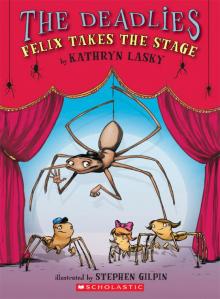 Felix Takes the Stage
Felix Takes the Stage Lucy
Lucy Lone Wolf
Lone Wolf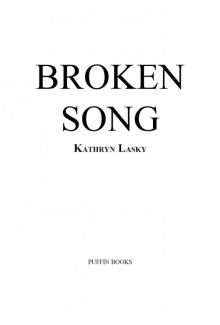 Broken Song
Broken Song The Shattering
The Shattering The Crossing
The Crossing May
May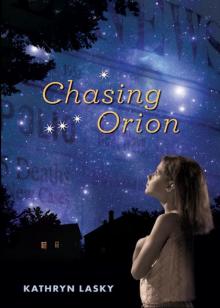 Chasing Orion
Chasing Orion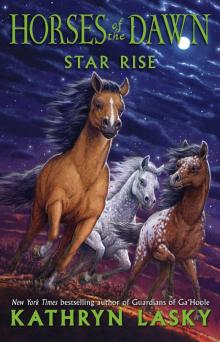 Star Rise
Star Rise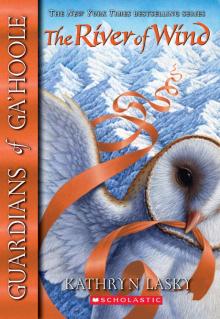 The River of Wind
The River of Wind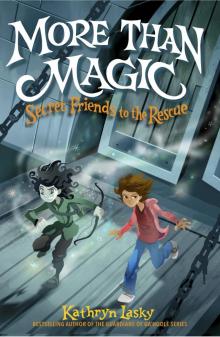 More Than Magic
More Than Magic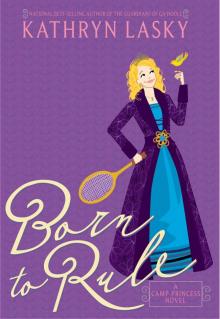 Born to Rule
Born to Rule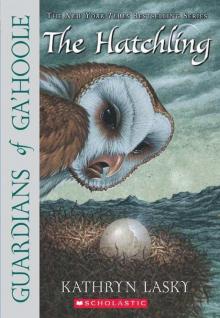 The Hatchling
The Hatchling The Rescue
The Rescue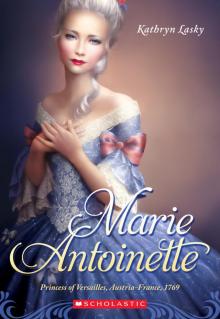 Marie Antoinette: Princess of Versailles, Austria - France, 1769
Marie Antoinette: Princess of Versailles, Austria - France, 1769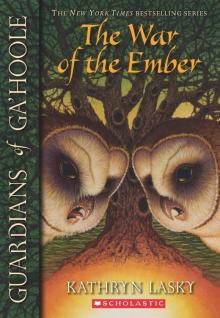 The War of the Ember
The War of the Ember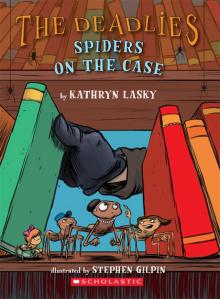 Spiders on the Case
Spiders on the Case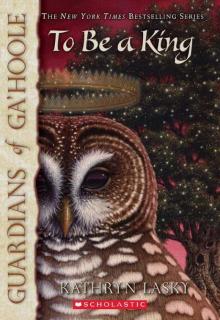 To Be a King
To Be a King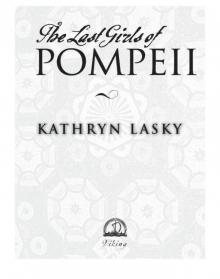 The Last Girls of Pompeii
The Last Girls of Pompeii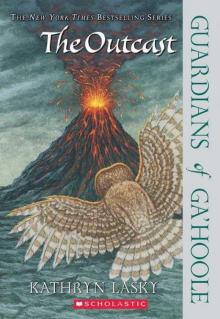 The Outcast
The Outcast Exile
Exile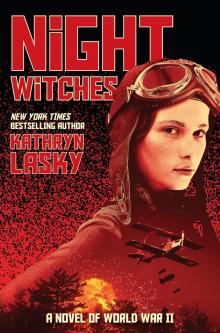 Night Witches
Night Witches Spirit Wolf
Spirit Wolf The Quest of the Cubs
The Quest of the Cubs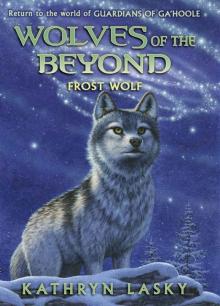 Frost Wolf
Frost Wolf The Keepers of the Keys
The Keepers of the Keys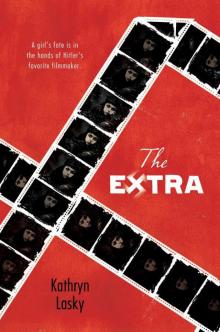 The Extra
The Extra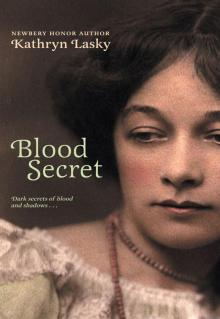 Blood Secret
Blood Secret Watch Wolf
Watch Wolf Blazing West, the Journal of Augustus Pelletier, the Lewis and Clark Expedition
Blazing West, the Journal of Augustus Pelletier, the Lewis and Clark Expedition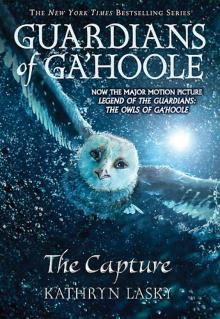 The Capture
The Capture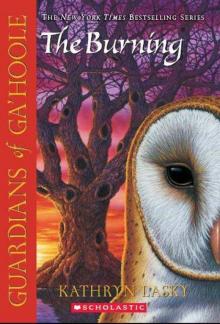 The Burning
The Burning The Journey
The Journey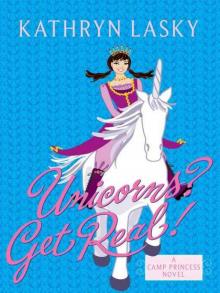 Unicorns? Get Real!
Unicorns? Get Real! The Escape
The Escape Star Wolf
Star Wolf Ashes
Ashes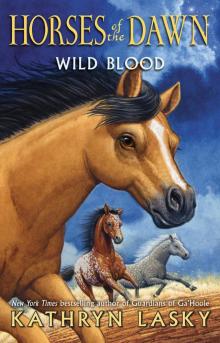 Wild Blood
Wild Blood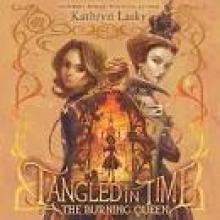 Tangled in Time 2
Tangled in Time 2 The Siege
The Siege Hannah
Hannah Elizabeth
Elizabeth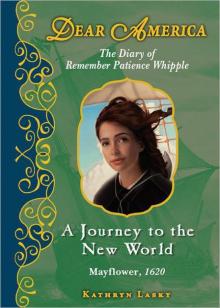 A Journey to the New World
A Journey to the New World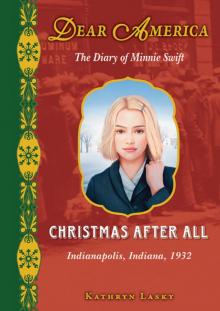 Christmas After All
Christmas After All Mary Queen of Scots
Mary Queen of Scots